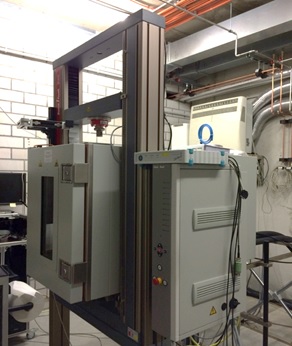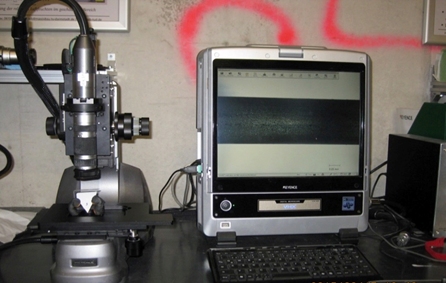Unique Research Labs
There are three specially equipped research labs in the GCC. Each lab is specified to one topic. Listed below you will find information on each of the labs at the GCC.
The adhesive lab with an area of 36m² is directly attached to the machine hall of the GCC and connected to it with a 2.20m wide door. In the adhesive laboratory, a wide variety of samples can be prepared for lamination and small samples can be pre-laminated in pre-composite. In addition, samples are stored here in climate chambers provided for this purpose until they are tested. The last application in the adhesive lab is the inspection of glasses under transmitted light to detect possible inclusions in the glass. The maximum sample or component dimensions that can be processed in the adhesive laboratory are approx. 1.50m x 1.50m.
Also on the 1st floor is the optical lab with a total size of approx. 20m². The special feature of this laboratory is, among other things, the platform projecting into the machine hall with an additional floor space of 2.2m x 2.5m. This platform is used to load the two laboratories on the first floor with large-format glass samples measuring up to 1.0m x 1.0m. In the optical laboratory itself, small glass elements can be examined under a light microscope.
Special Testing Machines
In addition to the research labs, the facility features a broad infrastructure of testing machinery. Listed below you will find information on the available testing machines.
For any rheological investigations, the GCC also features a rheometer. This device has a working temperature range in the convection oven from 23°C to 450°C. In combination with a modular nitrogen tank (EVU 10), a temperature range of – 130°C to 300°C can be realised. In addition, the air-cooled Peltier plate temperature control unit can ensure stable and accurate sample temperatures for all types of rheological measurements in the range from -40°C* to +200°C. The usual frequency range for the investigations is 0.01Hz to 100Hz.

The universal tensile tester at the GCC can perform compression, tension and bending tests with a force of up to 50kN. The possible test range is 640mm in width and 1,325mm in height, with possible test speeds of 0.0005mm/min to 600mm/min. In addition, this testing machine features a switchable climatic chamber with internal dimensions of 450mm x 650mm x 500mm and operating temperatures from -40°C to +250°C. In addition, a relative humidity of 10% to 89% can be set at any time in the range from +10°C to +80°C.













